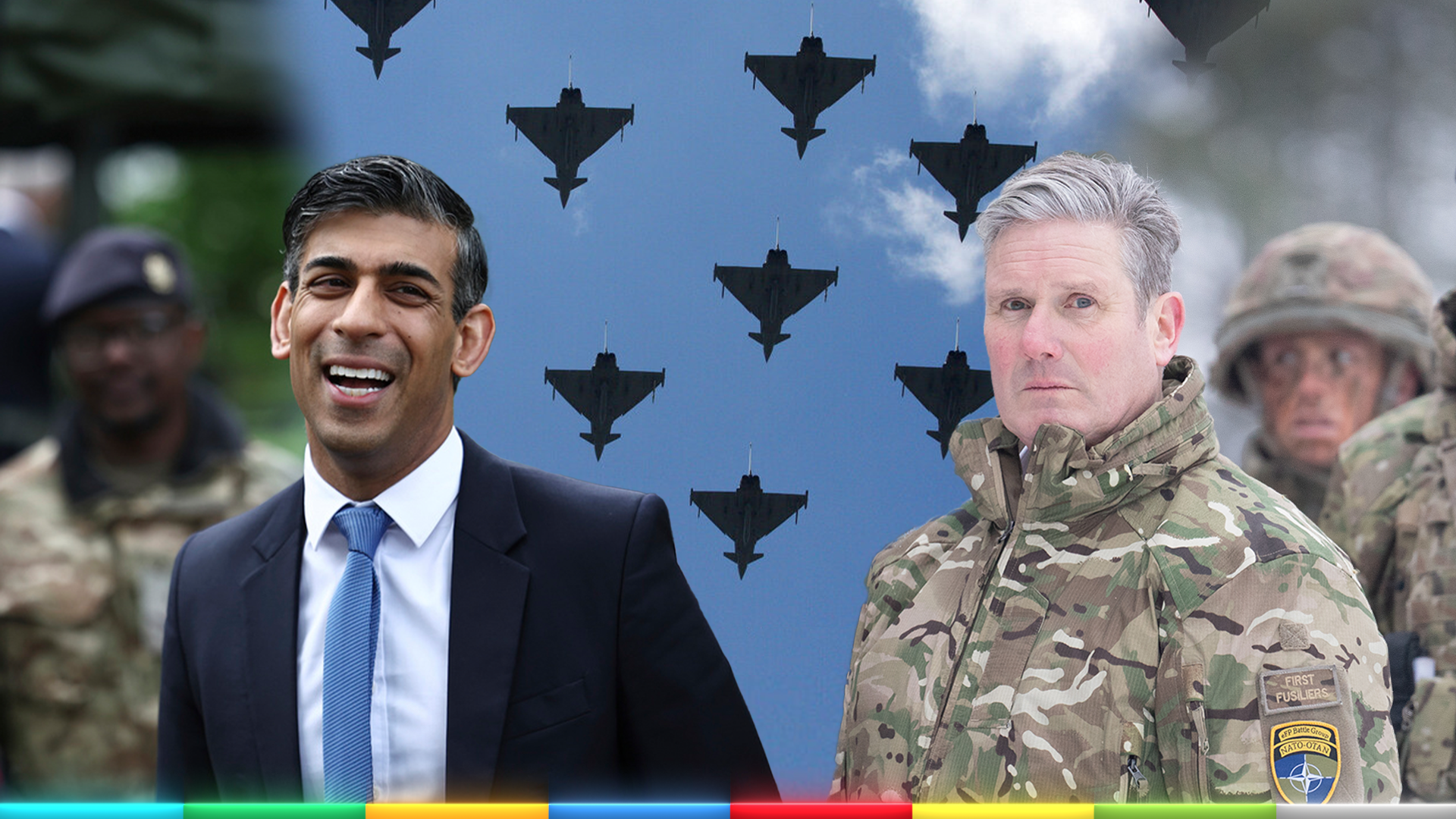Whether you heard the wet outdoor version of Rishi Sunak’s election campaign launch or the dry indoor one, his message on national security was the same.
“The world is more dangerous than it has been at any point since the end of the Cold War,” he told the small banner-waving crowd bussed in to the Excel centre, and it is only “we Conservatives who have that plan and are prepared to take that bold action to ensure the better future for our country and our children.”
The Conservative leader likes to remind voters that his Labour opponent, Sir Keir Starmer, served under and supported his predecessor, Jeremy Corbyn, who opposed Britain’s membership of NATO and the nation’s nuclear deterrent.
Labour has chosen the single word “change” as their main campaign slogan.
Sir Keir’s Labour Party has certainly changed a lot since the days of Mr Corbyn in relation to his views on defence.
Mr Corbyn has been kicked out of Labour on antisemitism issues and is challenging his old party as an independent in the Islington North constituency, which he has represented for 40 years.
Meanwhile, danger signals are flashing red over the conflicts in Ukraine and Israel and Gaza, amid identification of a new axis of anti-Western aggression, dubbed CRINK from the initial letters of China, Russia, Iran and North Korea.
Foreign policy is seldom a determining factor in UK general elections.
All politicians agree with opinion polls which show that voters are usually much more concerned with domestic issues such as the NHS, the economy and law and order.
Yet Conservative campaigners clearly see it as one of their main attack lines against Labour in this election.
Labour and Tories have similar plans on defence
Over the next six weeks we will find out how important defence is to the electorate and whether an untrustful public really sees any big dividing line between the two main parties on the issue.
They will not find any great difference if Sir Keir has his way, although in a bid not to stir up dissidents in his own ranks he has not made defence a key topic.
The morning before the election was called he withdrew from speaking at the London Defence Conference, perhaps reluctant to be pinned down on spending plans. His shadow defence secretary John Healey and shadow foreign secretary David Lammy went along instead.
Sir Keir has said repeatedly that national security is the first duty of any government.
Labour’s “change” posters are fringed with parts of the Union Jack.
Before the campaign, Sir Keir did his best to show that this is one area where there is more likely to be “no change” than “change”, if he replaces Mr Sunak as prime minister in July.
He visited the BAE Systems submarine works in Barrow-in-Furness, declaring his commitment to nuclear weapons to be “absolute” and “unshakeable”. In the extreme circumstances he pledged to press the nuclear button.
Sir Keir and his team visited Ukraine to demonstrate their support, including backing the current government’s plan for a Europe-leading £3bn annual funding.
The Conservatives have pledged to reach 2.5% of GDP spending by 2030 and claim Labour has no plans to do so.
But this week Mr Healey committed to matching the target “as soon as we can”.
The defence conference audience were unimpressed, however, when he said Labour would launch another year-long defence review should it win on 4 July.
If Labour is as close as it claims to the present government’s security policy this seems to be a waste of time.
In truth neither party has explained adequately how they would fund this extra spending, since it is predicated on the unfeasibly large cuts planned in other public spending in the next parliament to which both have nominally accepted.
This convoluted controversy might rouse core Conservative voters but it is unlikely to interest the wider electorate.
Please use Chrome browser for a more accessible video player
Voters unlikely to want cuts to help fund defence
Many defence experts believe 2.5% is just the low end of what should be spent to stay safe from the increased threats the prime minister identified.
Britain’s level of defence spending was significantly higher during the Cold War and last at 2.5% at the end of the New Labour government.
This week Deputy Prime Minister Oliver Dowden has added to the anxiety, talking up the threat from cyberattacks and urging citizens to stockpile vital supplies in case of emergencies.
But it would be hard to persuade voters to accept cuts in health, education or welfare to fund defence, and none of the parties are doing so in this election.
How Starmer’s Gaza stance could lose Labour votes
Concerns about security have risen in opinion polls but it is not a top-tier issue for voters. Traditionally it has been something where the Conservatives have been most trusted but surveys this year show Labour level with or ahead of the Tories.
On the other side of the argument, Labour’s strong line on defence could also cost it some votes.
Since the Hamas terror attacks on 7 October, there has been little difference between Mr Sunak and Sir Keir as they insisted Israel had a right to defend itself, including striking Gaza.
Please use Chrome browser for a more accessible video player
In some parts of the country, there is already evidence this could cost Labour votes, particularly where there is a significant Muslim population or a concentration of so-called “urban progressives”.
In May’s local elections, switchers from Labour to the Greens resulted in a record performance by the party. There are estimates that a similar voting pattern in the general election could cost Labour up to a dozen seats.
This would cut into Sir Keir’s hopes of a large majority and it is another reason why Labour will try to skirt divisive foreign policy issues during this campaign.
Please use Chrome browser for a more accessible video player
There is, of course, a possibility that a dramatic and violent development in warfare at home or abroad could galvanize the campaign.
Short of that the responsibilities of national security and foreign policy are set to weigh more heavily on the eventual winner than on the minds of the voters.
Within five days of the general election one of them will have to represent the UK at the NATO Summit in Washington DC from 9 to 11 July.
It is the 75th anniversary of the organisation and is being seen as the most important in its history, with major challenges to confront as a major European war rages in Ukraine.
The week after that Prime Minister Starmer or Sunak will host national leaders from the new European Political Community – an organisation calling out for Brexit Britain to make a major contribution to the defence of the continent.







